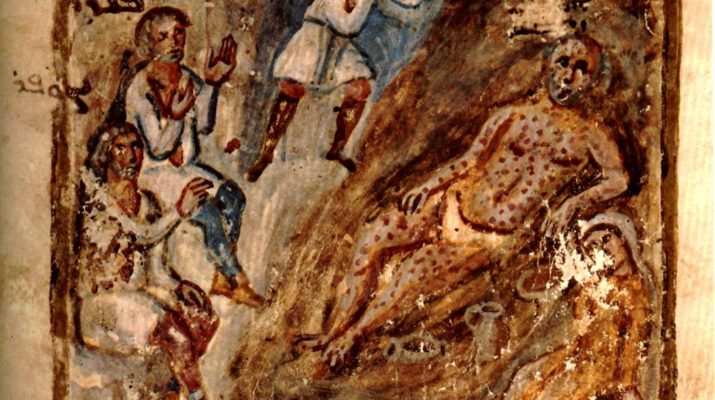Job 1:1 & 2:1-10
Ordinary B45
1:1 There wasA once a manB in the landC of UzD whose nameE was Job.F
A “was” = hayah. This is to be or become, to happen.
B “man” = ish. Perhaps from enosh (human, humankind, mortal); from anash (to be weak, sick, or frail). This is man, husband, another, or humankind.
C “land” = erets. Root may mean to be firm. This is earth, ground, field land, or country.
D “Uz” = Uts. 8x in OT. From uts (to plan, take counsel, consult). This is Uz – a personal name as well as the places where their descendants settled in Edom. It may be a Horite name. It may mean “consultation,” “contemplation,” “counselor,” or “inner strength.” See https://www.abarim-publications.com/Meaning/Uz.html
E “name” = shem. May be from sum (to put, place, set). This is name, fame, renown. A name was thought to indicate something essential about a person – something about their individuality. So, this word can also mean honor, authority, or character.
F “Job” = Iyyob. Perhaps from ayab (to hate or be hostile to). This is Job, a name that may mean “hated,” “enemy,” “persecuted,” “returning,” “no father,” or “where is my father?” See https://www.abarim-publications.com/Meaning/Job.html
That man was blamelessG and upright,H one who fearedI GodJ and turned awayK from evil.L
G “blameless” = tam. 14x in OT. From tamam (to finish or accomplish; to make perfect, demonstrate that you are upright; consume; to complete in a literal or figurative sense). This is complete, integrity, peaceful, perfect, blameless person, undefiled, upright. This is complete, generally from a moral perspective. It can be gentle or dear.
H “upright” = yashar. From yashar (to be straight, right, even, smooth, or agreeable; figuratively, to make something pleasant or prosperous). This is straight, right, level. Also, it is pleasing, whether pleasing God or pleasing other people. So, it is upright or righteous.
I “feared” = yare. This is to fear, be afraid, dreadful. It can also refer to fearful reverence – to fear in a moral sense is to say to revere, respect.
J “God” = Elohim.
K “turned away” = sur. This is to turn aside in a literal or figurative sense – to depart, decline, rebel, remove, or withdraw.
L “evil” = ra’. From ra’a’ (to be evil, bad, afflict; properly, to spoil – to destroy by breaking into pieces; figuratively, to cause something to be worthless; this is bad in a physical, social, or moral sense; that which displeases, to do harm or mischief, to punish or vex). This is bad, disagreeable, that which causes pain, misery, something having little or no value, something that is ethically bad, wicked, injury, calamity. This refers to anything that is not what it ought to be – a natural disaster, a disfigurement, an injury, a sin.
2:1 MOne day the heavenly beingsN cameO
M {untranslated} = hayah. Same as “was” in v1:1. See note A above.
N “heavenly beings” = ben + elohim. Literally, “sons of God.” Ben is from banah (to build or obtain children). This is son, age, child. It is son in a literal or figurative sense. Elohim is the same as “God” in v1:1. See note J above.
O “came” = bo. This is to enter, come in, advance, fulfill, bring offerings, enter to worship, attack. It can also have a sexual connotation.
to presentP themselves before the Lord,Q and SatanR also came amongS them to present himself before the Lord.
P “present” = yatsab. This is to set oneself, take a stand, remain, continue, to station or set something in place.
Q “Lord” = YHVH. Related to “was” in v1:1. From havah (to be, become) or hayah (see note A above). This is the name of the God of Israel, the self-existent and eternal one, the tetragrammaton. This pronunciation has been lost to time so “Lord” is generally used in its place.
R “Satan” = Satan. Perhaps from satan (to be an adversary, attack, accuse, resist). This is the Adversary. It could be personal, in reference to political enemies, or to refer to Satan.
S “among” = tavek. This is among, middle, in the midst, the center. Perhaps, properly, to sever.
2 The Lord said to Satan, “Where have you come from?”
Satan answeredT the Lord, “From going to and froU on the earth,V and from walking up and downW on it.”
T “answered” = anah. This is answer, respond, announce, sing, shout, or testify. It means to pay attention, which implies responding and, by extension, starting to talk. Used in a specific sense for singing, shouting, testifying, etc.
U “going to and fro” = shut. 13x in OT. This is to rove around, push forth, go back and forth. It can also refer to a rower as one who travels around.
V “earth” = erets. Same as “land” in v1:1. See note C above.
W “walking up and down” = halak. This is go, come, walk. It is walk literally and figuratively and includes people and animals. It can be used figuratively for one’s moral life – how we walk according to God’s way or against it. It can also refer to the walk of life as in the course one’s life takes, the choices we make, etc.
3 The Lord said to Satan, “Have youX consideredY my servantZ Job? There is no one like him on the earth, a blameless and upright man who fears God and turns away from evil.
X “you” = leb. May be related to labab (to encourage; properly, to be encased as with fat; used in a good sense, this means to transport someone with love; used in a bad sense, it can mean to dull one’s senses). This is the heart, courage, one’s inner self, the mind, or the will. Heart is only used in a figurative sense in the Old and New Testaments.
Y “considered” = sum. Related to “name” in v1:1. See note E above.
Z “servant” = ebed. From abad (to work, serve, compel; any kind of work; used causatively, can mean to enslave or keep in bondage). This is a servant, slave, or bondservant.
He still persistsAA in his integrity,BB although you incitedCC me against him, to destroyDD him for no reason.”EE
AA “persists” = chazaq. This is to strengthen, seize, be courageous, repair, bind, heal, conquer, harden.
BB “integrity” = tummah. Related to “blameless” in v1:1. 5x in OT. From tamam (see note G above). This is integrity or innocence.
CC “incited” = suth. 18x in OT. Perhaps from shayith (a thorn-bush or thorn; some kind of wild growth); perhaps from shith (to place, set, bring, appoint, consider, bring, array or look). This is to incite, induce, persuade, provoke, mislead, remove. It could be from the root in the sense of being pricked or agitated. It can imply being seduced.
DD “destroy” = bala. This is to swallow, engulf, cover, or destroy.
EE “for no reason” = chinnam. From chen (grace, favor, kindness, beauty, precious); from chanan (beseech, show favor, be gracious; properly, to bend in kindness to someone with less status). This is out of favor, so it can mean without cost, without payment, nothing, vain, or useless.
4 Then Satan answered the Lord, “SkinFF forGG skin! All that peopleHH have they will giveII to saveJJ their lives.KK
FF “skin” = or. Perhaps from ur (to be made naked, exposed, or bare). This is skin, hide, or leather. It can also refer to a body.
GG “for” = baad. Perhaps from ad (to, until, while); from adah (to pass on, advance, decorate oneself). This is at, behind, about, for, on behalf of, over against.
HH “people” = ish. Same as “man” in v1:1. See note B above.
II “give” = natan. This is to give, put, set, offer. It is to give literally or figuratively.
JJ “to save” = baad. Same as “for” in v2:4. See note GG above.
KK “lives” = nephesh. Related to naphash (to refresh or be refreshed). This is soul, self, person, emotion. It is a breathing creature. Can also refer to appetites and desires.
5 But stretch outLL your handMM nowNN
LL “stretch out” = shalach. This is to send out, away, send for, forsake. It can also mean to divorce or set a slave free.
MM “hand” = yad. This is hand, ability, power. Hand in a literal sense, but also what one can do or the means by which one does it.
NN “now” = na. This particle is used for requests or for urging. It can be we pray, now, I ask you, oh. This is the same “na” in “hosanna.”
and touchOO his bonePP and his flesh,QQ and he will curseRR you to your face.”SS
OO “touch” = naga. This is touch, reach, arrive, come near, strike. This is touching for any reason including sexual or violent.
PP “bone” = etsem. From atsam (vast, numerous, strong; to close one’s eyes, to make powerful; to break bones). This is self, life, strength, bone, or substance.
QQ “flesh” = basar. From basar (being a messenger, publish, carry preach; properly, this is being fresh, rosy or cheerful as one bearing news). This is flesh, the body, fat, skin, self, nakedness, humankind, or kin. It can also refer to private parts.
RR “curse” = barak. This is to kneel, to bless. It is blessing God as part of worship and adoration or blessing humans to help them. It can be used as a euphemism to say curse God.
SS “face” = paneh. From panah (to turn, face, appear). This is face in a literal or figurative sense. It could be face, presence, anger, respect. It can also be used of God to indicate divine favor or presence.
6 The LordTT said to Satan, “Very well,UU he is in your power;VV only spareWW his life.”
TT “Lord” = YHVH. Related to “was” in v1:1 & “Lord” in v2:1. It has a different vowel pointing, but the same meaning as “Lord.” See note Q above.
UU “very well” = hen. This is a remark of surprise or excitement: lo! Behold! It can also mean if or though.
VV “power” = yad. Same as “hand” in v2:5. See note MM above.
WW “spare” = shamar. This is to keep, watch, or preserve. It means to guard something or to protect it as a thorny hedge protects something.
7 So Satan went outXX from the presenceYY of the Lord, and inflictedZZ loathsomeAAA soresBBB on Job
XX “went out” = yatsa. This is to go or come out, bring forth, appear. It is to go out in a literal or figurative sense.
YY “presence” = paneh. Same as “face” in v2:5. See note SS above.
ZZ “inflicted” = nakah. This is to hit whether lightly or severely. It can be used in a literal or figurative sense. So, this could be beat, punish, give wounds, kill, or slaughter.
AAA “loathsome” = ra’. Same as “evil” in v1:1. See note L above.
BBB “sores” = shechin. 13x in OT – word used for the boils in the sixth plague of Egypt in Exodus 9. This is a boil, inflammation, or ulcer.
from the soleCCC of his footDDD to the crown of his head.EEE
CCC “sole” = kaph. From kaphaph (to bend – from a root meaning curve or bend down). This is palm of the hand or sole of the foot, footstep, grasp. Figuratively, it can also mean power.
DDD “foot” = regel. This is foot, endurance, or journey. It is a foot as the means of walking and so it implies a step or a greater journey. It can be used euphemistically for private parts.
EEE “crown of his head” = qodqod. 11x in OT. Perhaps from qadad (to bow the head, stoop, bow in deference). This is the scalp or crown of the head.
8 Job tookFFF a potsherdGGG with which to scrapeHHH himself, and satIII among the ashes.JJJ
FFF “took” = laqach. This is to take, accept, carry away, receive. It can also have the sense of take a wife or take in marriage.
GGG “potsherd” = cheres. 17x in OT. This is earthenware, a potsherd, a stone.
HHH “scrape” = garad. 1x in OT. This is to scrape or abrade.
III “sat” = yashab. This is to sit and so to remain and so to dwell. It is sitting for any reason – as a judge, in order to ambush, or just sitting quietly. Causatively, this can mean settling or marrying. This can also mean continue, endure, or establish.
JJJ “ashes” = epher. Root may mean to strew. This is ashes or dust.
9 Then his wifeKKK said to him, “Do you still persist in your integrity? Curse God, and die.”LLL
10 But he said to her, “You speakMMM as anyNNN foolish womanOOO would speak.
KKK “wife” = ishshah. Related to “man” in v1:1. From ish (see note B above). This is woman, wife, or female.
LLL “die” = mut. This is to die in a literal or figurative sense. It can also refer to being a dead body.
MMM “speak” = dabar. This is generally to speak, answer, declare, or command. It might mean to arrange and so to speak in a figurative sense as arranging words.
NNN “any” = echad. Perhaps from achad (to unify, continue on a path; figuratively, to gather one’s thoughts). This is the number one, first, united. It can also be alone, altogether, a certain, a few.
OOO “foolish woman” = nabal. 18x in OT. From nabal (to be foolish, senseless, fall away, faint, wither, to be wicked, disgrace). This is foolish or a fool. It can also mean impious. Nabal, taken from this root, was the name of Abigail’s first husband in 1 Samuel 25.
Shall we receivePPP the goodQQQ at the hand of God, and not receive the bad?”RRR In all this Job did not sinSSS with his lips.TTT
PPP “receive” = qabal. 13x in OT. This is to receive, undertake, choose, adopt as a custom. It can be literal or figurative.
QQQ “good” = tob. From tob (to be pleasing, to be good). This is good, beautiful, pleasant, agreeable, bountiful, at ease. This word is used for goodness as a concept, a good thing, a good person. This can refer to prosperity and welfare as well as joy, kindness, sweetness, and graciousness. So, this is ethically good, but also enjoyably good.
RRR “bad” = ra’. Same as “evil” in v1:1. See note L above.
SSS “sin” = chata. This is properly to miss, and so figuratively it is used for sinning, bearing the blame. It implies a forfeiture or loss of something.
TTT “lips” = saphah. This is lip, edge, border, bank – used for a boundary. It can also be speech or language.
Image credit: “Job’s Sufferings” from the Syriac Bible of Paris, 6th-7th century.




